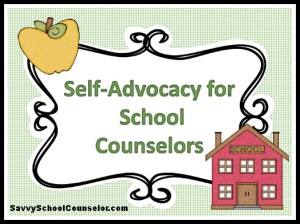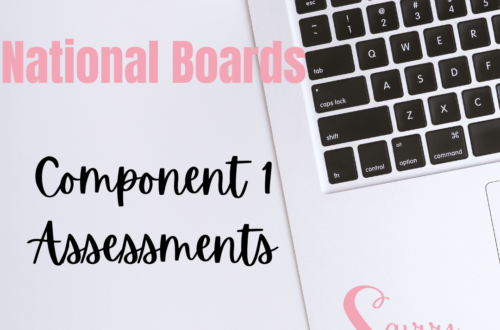Self-Advocacy for School Counselors
 I have thought a lot this summer about self-advocacy for school counselors. I started outlining this post, and a few days later I received an email from a new school counselor who is really in a difficult situation with her new position. She is assigned to SIX schools and isn’t feeling the love so far. Unfortunately, my email response to her came back to me undelivered. So, I’m hoping she will see this post and contact me again.
I have thought a lot this summer about self-advocacy for school counselors. I started outlining this post, and a few days later I received an email from a new school counselor who is really in a difficult situation with her new position. She is assigned to SIX schools and isn’t feeling the love so far. Unfortunately, my email response to her came back to me undelivered. So, I’m hoping she will see this post and contact me again.
I want to preface this post by saying, administrative support is key! Regardless of the level of support, it is important for you to advocate for your program. In the end, your administrator has the final say. Even if you don’t feel supported, know that you’ve done all you can by advocating for yourself. If you don’t, who will?
Avoid Discipline Issues
As school counselors, we pride ourselves in creating positive relationships with our students. We work hard to build a good rapport and establish trust with the students we come in contact with each day. This can be hindered if we are asked to handle disciplinary situations at our schools. Assisting with disciplinary issues will confuse children about your role. Instead of seeing you as their adult friend, they will not look forward to coming to your office. Let your administrators and teachers know where you stand to help avoid being involved with discipline. Also, be sure to let your students know they are never “in trouble” when they come to see you. Let them know from the beginning during your introductory classroom counseling lessons.
Avoid the Therapy Trap
Although school counselors have degrees in counseling, we are unable to provide regular therapy to students. If there is a student needing to be seen once a week for the whole school year, they need more than you can effectively give them. This doesn’t mean you won’t have some students who come to see you for consecutive sessions. Be sure to state up front how many sessions the student will have with you. Last year, I purchased the loyalty cards sold on Vistaprint. I got the idea from THIS BLOG. They have five boxes along the bottom that can be punched or stamped. This is a great visual for your students to know how many times they will get to visit with you. Of course, all students won’t need to use the cards, but they are great to have for the ones needing more extensive counseling.
If an IEP or Behavior Plan has included you as an “intervention,” be sure to speak up. Yes, you want to work with the student, but being bound in writing by plans like these can be detrimental to your program. Sometimes the writers of these plans need to be reminded that the student they are creating the plan for isn’t the only student you are working with. They won’t always see your “big picture.” Self-advocacy will help make the picture more clear.
Implementing Your Program
I don’t know about you, but running my school counseling program is very important to me. When I get caught up for days or weeks where I am unable to run my program because of other “school related assignments,” it bothers me to no end. We can’t always avoid these, but we can still speak up. The ASCA National Model was created to help with this, so be sure to create yours and make sure your administration has a copy. We are accountable for following through with the closing the gap action plans we create each school year.
Along with your National Model, you’ll want to be sure to “market” your program. You can read more about school counselor public relations HERE. Showing pride in your school counseling program is also a great way to advocate for it.
Management Agreement
As I said before, support from your administration is key. The management agreement is a part of your ASCA National Model plan. This agreement is a great way to gain support from your principal. It outlines all of your programs and services. It details the percentage of time you will spend delivering your curriculum, planning for individual students, providing responsive services and lending system support. All of this is done with hopes that you won’t end up doing all of the non-counseling duties we are so often stuck with. It assists you with advocating for your program.
There are some school counselors who are able to truly do their jobs each day, and that is wonderful! If you find yourself in a situation that goes against the grain of your school counseling program, speak up. Doing so may help you get what’s needed to make your program effective. If it doesn’t, you can feel good knowing you spoke up and advocated for yourself and your program.
To the school counselor who reached out: I hope to hear back from you again so I can re-send my email to you. 🙂
Stick around! You can follow Savvy School Counselor with free email updates. You can also follow my TpT Store to keep up with my latest products and freebies.




2 Comments
Laura Filtness
I can’t tell you how I often I refer to this blog post. It’s fantastic. I updated my blog so it didn’t sound too much like “Savvy” so my new blog is: http://pawsitiveschoolcounseling.blogspot.com/ and the link to the loyalty cards is: http://pawsitiveschoolcounseling.blogspot.com/2012/06/brand-me-counseling-pr.html
Vanessa
Thanks, Laura! I will update the link. I just had someone ask me about them!